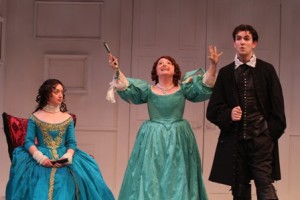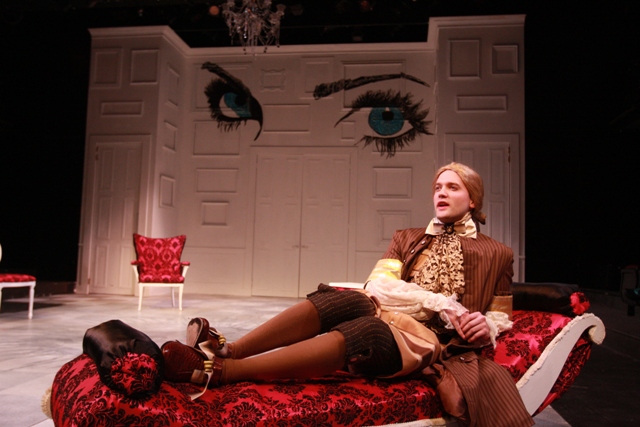Mis•an•thrope – a person who does not like other people, a cynic, a pessimist.
Villanova University’s Vasey Hall is alive with frivolity as the Theatre Department presents THE SCHOOL FOR LIES, David Ives’ pithy adaptation of Molière’s farce The Misanthrope. Directed by Kathryn MacMillan (Associate Artistic Director at the Lantern Theatre Company), this wildly ribald farce runs February 11th thru the 23rd. The setting is the Parisienne salon of the widowed Celimene, so well renowned for her clever and satirical barbs that she is being sued for it. At her beck and call are three very superficial suitors she’s been stringing along—and managing to live off of (Acaste, who looks on his stupidity as a virtue, Oronte, an exceedingly supercilious and bad poet, and Clitander, a pompous barrister). But her heart has been closed since the death of her beloved and adoring husband, Alceste. Aiding her in her endeavors are her cousin Eliante (a romantic young woman) and her friend Philinte, a young noble in love with Eliante; and trying to thwart her at every turn is her jealous “best friend,” Arsinoé. Into this mix comes a brash stranger who goes by the name of “Frank.” In very short order he manages to turn everyone’s world on its ear, including Celimene’s poor hapless servant, DuBois.
Molière was one of France’s premier farceurs, and an adept practitioner of Commedia dell’Arte (a genre of theatre known for its physical bits and use of archetypes). Though welcomed at court and under the patronage of King Louis XVI, Molière wrote The Misanthrope in 1666 to poke fun at the shallowness of the nobility. Ives’ 2011 adaptation puts a modern spin on Moliere’s story, tweaking the plot slightly and injecting contemporary slang throughout. Ives retains the use of rhyming couplets (and the 17th century setting), but switches to an Iambic pentameter scheme as opposed to Molière’s Alexandrine rhythm—which most viewers today find difficult to follow. Ives’ mastery of the style is brilliant; THE SCHOOL FOR LIES is chock full of hilariously clever wordplay. You will find yourself in awe of the language as you laugh uproariously at the jokes.

Victoria Rose Bonito as Celimene, Meghan Winch as Eliante and Seth Thomas Schmitt-Hall as Frank. (Photo credit: Paola Nogueras)
Of course, the success of any joke (classic or contemporary) lies in timing and delivery. Director MacMillan has done a splendid job of getting her cast of nine to achieve both, pacing the production wonderfully. She has instilled the ensemble with a true sense of how to convey the heightened style of Molière’s theatre, yet make the characters very relatable to 21st century audiences. Seth Thomas Schmitt-Hall anchors the group as the outspoken Frank, imbuing the character with tremendous energy and charm. He is terrific at playing with the language, only getting “ahead of himself” once or twice. Matching him barb for barb is Victoria Rose Bonito as Celimene, who brings a dry, acerbic wit to the table. Yet there is an underlying gentleness to Bonito’s performance, making the viewer aware at just the right moments of her character’s tragic loss. Julie George-Carlson is a hoot as Arsinoé, the so-called best friend; she commands the stage both times she appears. The “troika” of suitors is brought hilariously to life by Brendan Maxwell Farrell (Acaste), Chris Monaco (Oronte) and Peter Andrew Danzig (Clitander). Each is delightful to watch throughout, never going too far into caricature, yet honoring Molière’s archetypes perfectly. Farrell is adorable as the dolt—it takes a smart actor to play dumb. Monaco is new to the Villanova stage—I look forward to seeing more of his work if this is an example of his talents. Danzig revels in his pomposity, giving nicely calibrated reactions to Frank’s deliberate mangling of his name (I won’t give away the joke here, but think about the possibilities). Meghan Winch breathes wonderful life into the romantic Eliante, but she knows how to deliver the jokes when needed. Mitchell Bloom rounds out the ensemble as Philinte. He starts off the production with a hilarious prologue that acknowledges the source material but makes it clear we’re about to see something uniquely 21st century. And Bloom never disappoints from start to finish—watch for an audacious surprise in Act II.
As always, the technical support is topnotch, starting with Thom Weaver’s simple yet nuanced scenic design. Louis XVI’s “Sun King” design is at the center of a gray and white checkerboard floor, upon which a few elegant white furniture pieces are placed. They give the feel of an upscale contemporary spa while paying homage to 17th century décor—and the pop of the red and black brocaded fabric adds a nice wow. Janus Stefanowicz’s costumes are “wow” as well. She is an artiste when it comes to period details—and editorializing about the character. Jerold R. Forsyth has provided his usual solid lighting effects and John Stovicek has artfully blended classical chamber music with contemporary techno music for the soundscape.
Never fear that THE SCHOOL FOR LIES is stodgy and to be “suffered through”—you will thoroughly enjoy yourself. Villanova is to be commended for always finding ways to engage their primarily student audiences in the classics by presenting them in fun new ways. The “non-students” like myself just had a rip-roaring good time, and, for a couple of hours at least, escaped the weather worries this winter has brought.
THE SCHOOL FOR LIES
Adapted from Moliere’s The Misanthrope
By David Ives
Directed by Kathryn MacMillan
Villanova Theatre-Vasey Hall
February 11—23, 2014
610-519-7474
www.villanovatheatre.org


